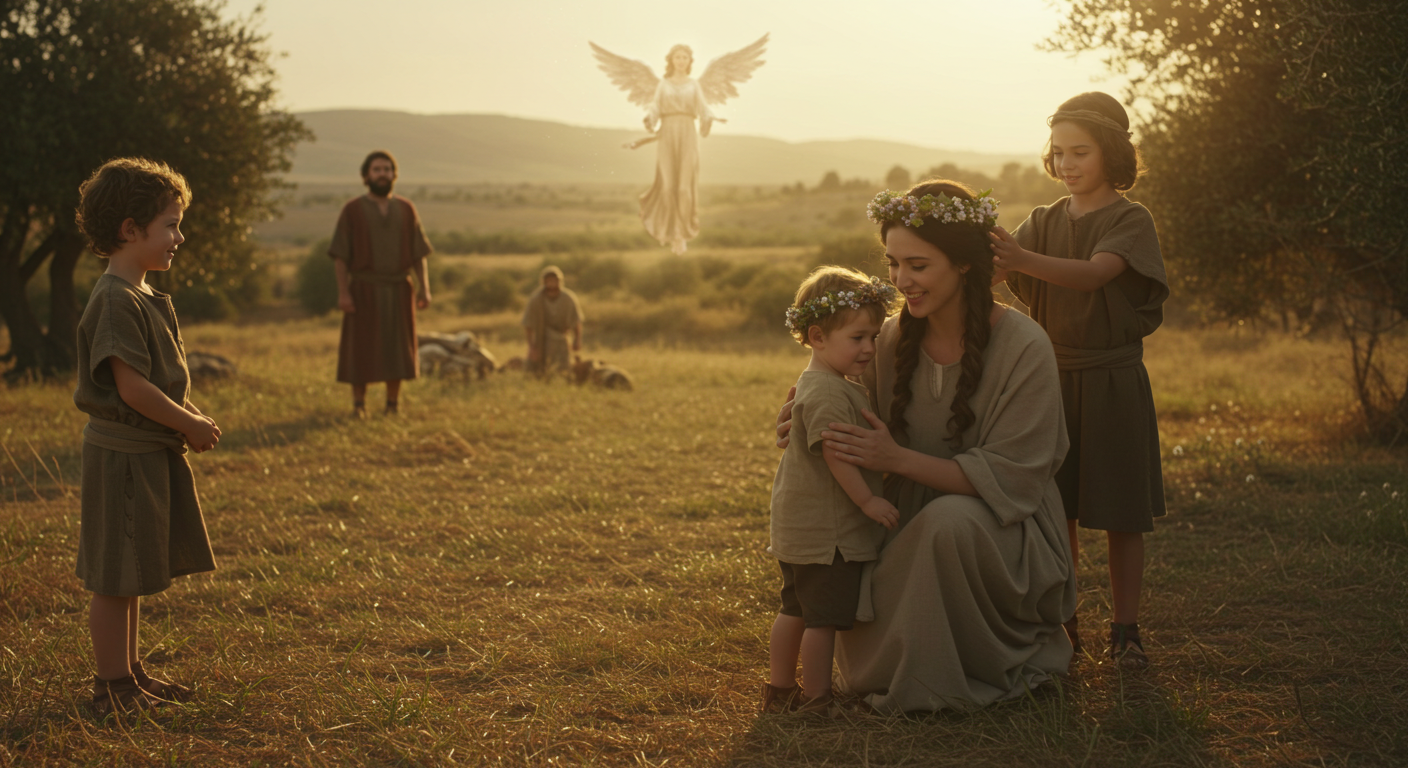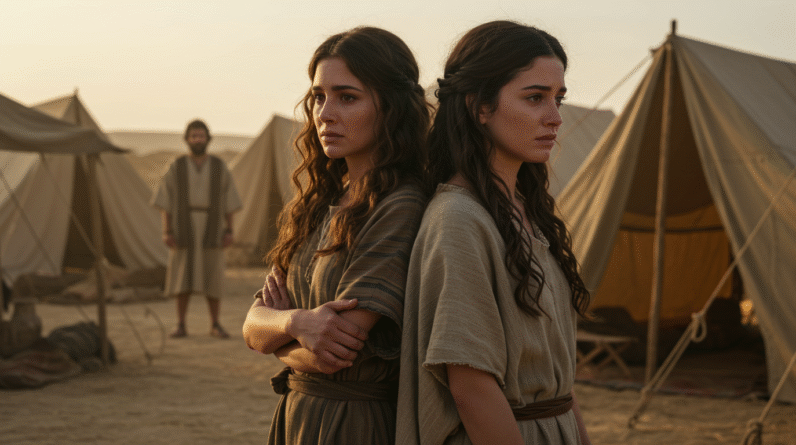Discover Leah’s story in Genesis 29-30: a journey of unnoticed love, divine recognition, and enduring legacy, showcasing her pivotal role in biblical history.
Leah in the Shadows: Seen by God (Genesis 29-30)
Introduction
Life often feels like a series of stages where we hope to emerge as central figures in our narratives. Yet, many of us find ourselves standing in the shadows, silently seeking affirmation and love. Leah, a woman from ancient times, embodies this very experience. Her initial anonymity in the sermons and stories of Genesis contrasts sharply with her profound depth of character and the divine attention she receives. Her tale, beginning in Genesis 29, is one of God’s unwavering vision in a world that often overlooks the quiet fighters.
📖 Key Verse or Passage
The heart of Leah’s story offers a timeless lesson about seeing and being seen. In Genesis 29:31, the scripture tells us, “When the Lord saw that Leah was not loved, he enabled her to conceive, but Rachel remained childless.”

Understanding Leah’s Position
Leah’s Struggle for Love
Leah’s life unfolded under challenging conditions. In a culture where one’s worth was heavily tied to marriage and motherhood, Leah was married off to Jacob by her father, Laban, under a veil of deception. Jacob, smitten by Leah’s younger sister Rachel, worked seven years intending to marry her, only to be handed Leah in the dark. The pain of unreciprocated love was tangible. Yet, Leah hoped each child she bore would erase Jacob’s indifference and ignite a passion similar to what he felt for Rachel.
Her ongoing struggle for emotional affirmation resonates with anyone who has ever craved appreciation from a distant loved one. But how often do we pause to consider the divine gaze upon us in these moments of solitude?
Leah and Rachel: A Study in Contrasts
Sibling rivalry is a tale as old as time, and Leah and Rachel’s story adds another dimension to this dynamic. Rachel, with her beauty and Jacob’s immediate affection, seemed to have all Leah desired. Leah, overshadowed by Rachel’s allure, showcases a relatable theme: the perils of comparing oneself to others.
In the backdrop of their rivalry, Leah’s heartache and Rachel’s frustrations merge into a broader narrative of human insecurities. Yet, through these trying circumstances, God’s presence is a constant—a testament that divine love addresses our deepest needs beyond earthly comparisons.
God’s Compassionate Recognition
Divine Intervention and Blessings
One of the most poignant aspects of Leah’s story is how the Lord perceives her distress. Genesis 29:31 states, “When the Lord saw that Leah was not loved, he enabled her to conceive.” Her children were not just blessings but symbols of God’s direct communication to her spirit. They reflected the assurance that she was neither forgotten nor unloved by the Creator.
As her sons were born, each was named not just with the hope of altering her fortunes with Jacob, but as markers of her evolving relationship with God, showing a transition from yearning for human love to understanding divine purpose.
The Power of Naming
Naming in ancient cultures held significant power and meaning, and Leah named her children with intention and foresight. For instance, her first son, Reuben, means “See, a son,” signifying Leah’s silent plea for Jacob to truly see her. While each consecutive name pointed to Leah’s growing connection with God, by the time her fourth son, Judah, was born, Leah shifted focus from lament to praise, as in, “Now I will praise the Lord” (Genesis 29:35).
This progression from Reuben to Judah showcases Leah’s journey from seeking validation from others to grounding herself in a higher affirmation and gratitude.
Leah’s Lasting Legacy
The Ancestor of Kings
Leah’s significance extends far beyond her personal life. Through Judah, Leah became the matriarch of a lineage culminating in King David and, eventually, Jesus Christ. Her place in this line is a powerful reminder that those who seem forgotten in human history often play pivotal roles in divine narratives.
In hindsight, Leah’s hidden story reveals the truth that impact is not always measured by immediate recognition but by the seeds sown for the future.
Lessons from Leah in Modern Life
Leah’s narrative speaks volumes to anyone who has ever felt marginalized or undervalued in a world that frequently applauds superficial beauty over quiet endurance. Her story teaches us several enduring lessons:
- Divine Love: Even if overlooked by the world, you are seen and treasured by God.
- Internal Worth: True worth is derived from one’s relationship with the divine, not merely human affirmation.
- Enduring Impact: Your legacy might not be apparent in the present, but it can ripple through future generations in ways unimaginable.
Conclusion
Leah’s story, a profound tapestry of silent suffering, divine recognition, and enduring faith, remains an emblem for many who walk through life in the shadows. Her legacy—carrying the lineage of kings and saviors—whispers to every soul that feels unseen. It challenges you to trust in a God who sees all, loves deeply, and works relentlessly for your good. As you reflect on Leah’s journey, consider how your unnoticed acts of faith and love contribute to a story far greater than any earthly narrative can capture.

🔍 Explore More Bible Insights:
✅ 1. The Role of Eliab – David’s Brother in His Journey to Facing Goliath
Tone: Relational, reflective, character-focused
🔹 “Family Tensions and God’s Purpose – Discover the Connection”
Read it here.»
✅ 2. What Jeremiah 29:11 Means for Us Today
Tone: Hopeful, encouraging, life application
🔹 “God’s Plans Still Stand – Find Your Hope Here”
Read it here.»
✅ 3. The Wise and Foolish Builders – A Strong Foundation in Faith (Matthew 7:24-27)
Tone: Foundational, practical, discipleship
🔹 “Build Your Life on the Rock – Keep Learning”
Read it here.»
✅ 4. The Roman Centurion at the Cross – A Moment of Revelation
Tone: Awe-inspiring, redemptive, gospel-centered
🔹 “From Witness to Believer – Read His Revelation”
Read it here.»
As a ClickBank Affiliate, I earn from qualifying purchases.
Acknowledgment: All Bible verses referenced in this article were accessed via Bible Gateway (or Bible Hub).
“Want to explore more? Check out our latest post on Why Jesus? and discover the life-changing truth of the Gospel!”








